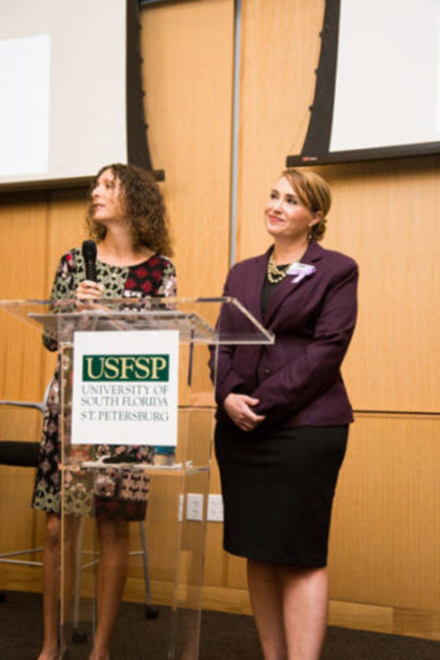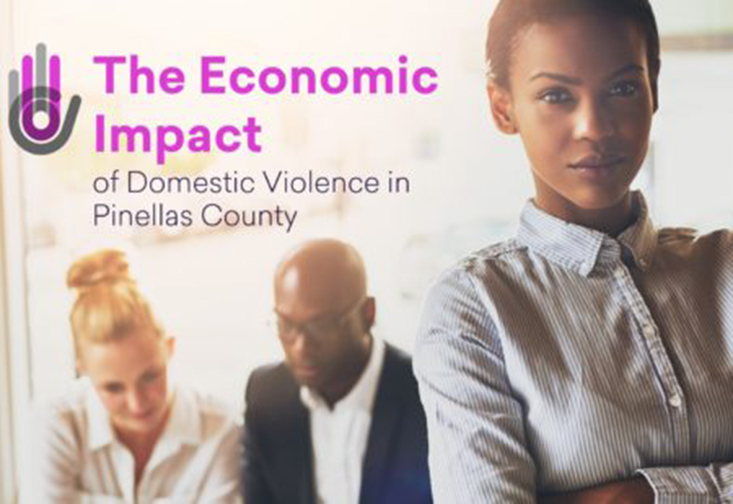The cost of domestic violence in Pinellas County is $132 million a year, or roughly $21,000 per victim. These are the findings from a new study out of USF St. Petersburg that sought to quantify the economic impact of rape, physical assault, stalking and other acts of domestic violence to individuals, families and the community.
Partnering with Community Action Stops Abuse (CASA), researchers from the Kate Tiedemann College of Businessanalyzed local and national economic data on costs of medical care, emergency housing and lost wages as a result of domestic violence. They calculated and combined those figures with the 6,228 incidents of domestic violence that were reported in Pinellas County in 2017 – eight of which were fatalities – to end up with the overall figure.
“This analysis helps to put a conservative dollar value on what domestic violence costs the community, and really highlights the many types of costs there are when it comes to domestic violence,” said Economics Instructor Rebecca Harris, who was a researcher on the study.
Many of the costs associated with domestic violence are hard to measure, due to unavailable data or intangible costs. USFSP researchers gathered and analyzed data from CASA, local agencies that support domestic violence victims and local law enforcement reports and figures. Where local data was unavailable, the team used national data on domestic violence costs.
Once they determined the findings, they categorized the costs into five major buckets:
- Cost to community at $81 million; such as days missed from work, children in foster care, court and law enforcement resources used and even lost wages of those who commit the abuse who are now in jail,
- Cost of long-term impact at $37 million; including loss of lifetime earnings due to premature death and the value of lifetime suffering from abuse, for which researchers utilized a similar calculation that juries and insurance companies use to assess damages;
- Cost of health care at around $5.5 million; such as emergency room visits, ambulance, physical therapy and mental health care,
- Cost of emergency housing and lost or damaged supplies at $4.5 million; including shelters, food, transportation, childcare and valuables left behind, and
- Cost of support services at $3.5 million; programs and interventions that help victims and their children and try and prevent future abuse.

“The costs aren’t just to the victims of domestic violence and their children, but they are also borne by society,” said Harris. “We end up paying for law enforcement who are protecting victims and for court costs of judges and bailiffs involved in these cases. Also, the employer pays the cost of finding new employees or filling shifts and rearranging schedules for those who miss work.”
Researchers say the analysis is conservative because data suggests many cases of domestic violence go unreported, as there is a major discrepancy between number of victims who indicate abuse in surveys and those who actually report it to authorities. According to the National Domestic Violence Hotline, humiliation, fear of retribution and emotional attachment are a few factors that contribute to under reporting. The Hotline also calculates that among reported incidents, there are on average seven unreported incidents that occur before a victim finally reports abuse.
“At CASA, we believe that violence can only thrive in silence. To change the domestic violence paradigm, we must erase the stigma and silence that protect it; we’re hopeful that this study will help to do just that,” said CASA CEO, Lariana Forsythe. “When you start talking about the impact to our tax dollars, our healthcare system and to the bottom line of local businesses, domestic violence no longer seems invisible or easy to ignore.”
The study was a joint effort between the Institute for Data Analytics and Visualization and the Women and Leadership Initiative, both housed at USFSP. The Institute for Data Analytics serves the college, the city and Pinellas County by conducting applied research, addressing business challenges and offering professional development programs. The Women and Leadership Initiative seeks to promote women in the workplace and equip them for advancement while also highlighting family work-life challenges through academic programs and sponsored research, mentorship and leadership training.
